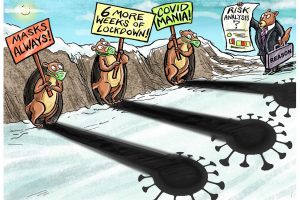WSJ Opinion: An American Epidemic of ‘Covid Mania’
The problem isn’t only the overreaction to the virus but the diminution of every other problem.
By Joseph A. Ladapo
April 19, 2021 6:30 pm ET
What are the lessons of Covid-19? It depends who you ask. Some believe politicization of the pandemic response cost lives. Others believe a stronger U.S. public-health system would have reduced Covid-19 deaths significantly. Still others say lockdowns should have been longer and more stringent, or that they were ineffective. But one lesson that should transcend ideological differences: Don’t put one illness above all other problems in society, a condition known as “Covid mania.”

The novel coronavirus has caused suffering and heartbreak, particularly for older adults and their loved ones. But it also has a low mortality rate among most people and especially the young—estimated at 0.01% for people under 40—and therefore never posed a serious threat to social and economic institutions. Compassion and realism need not be enemies. But Covid mania crowded out reasoned and wise policy making.
Americans groaned when leaders first called for “two weeks to slow the spread” in March 2020. Months later, many of these same Americans hardly blinked when leaders declared that lockdowns should continue indefinitely. For months Covid had been elevated above all other problems in society. Over time new rules were written and new norms accepted.
Liberty has played a special role in U.S. history, fueling advances from independence to emancipation to the fight for equal rights for women and racial minorities. Unfortunately, Covid mania led many policy makers to treat liberty as a nuisance rather than a core American principle.
Covid mania has also wreaked havoc on science and its influence on policy. While scientists’ passion for discovery and improving health has fueled research on the novel coronavirus, Covid mania has interpreted scientific advancements through an increasingly narrow frame. There has only been one question: How can scientific findings be deployed to reduce Covid-19 spread? It hasn’t mattered how impractical these measures may be. Discoveries that might have helped save lives, such as better outpatient therapies, were ignored because they didn’t fit the desired policy outcome.
A prime example is mask research. However one feels about wearing masks, look at the evidence from California. Despite a mask mandate imposed last April and steady, high rates of compliance, California experienced a surge in Covid-19 cases over the winter.
Mandating masks may help in some settings, but masks are not the panacea officials have presented them as. In September, then-Centers for Disease Control and Prevention director Robert Redfield declared that “this face mask is more guaranteed to protect me against Covid than when I take a Covid vaccine.”
The statement was remarkable because he made it before seeing vaccine trial data. Those data and data from people who have recovered from Covid clearly demonstrate that this statement is false. Immunity is far more effective than whatever efficacy masks may offer.
Covid mania is also creating new conflicts over vaccine mandates. The same people who assured the public that a few weeks of lockdown would control the pandemic now argue that vaccinating children, for whom no vaccine has yet been approved, is essential to end the pandemic. Children account for less than 0.1% of Covid deaths in the U.S. Is enough known about vaccines to conclude that their benefits outweigh potential risks to children?
“Yes” is the answer of a salesman, not a scientist. Mandating a vaccine for children without knowing whether the benefits outweigh the risks is unethical. People who insist we should press on anyway, because variants will prolong the pandemic, should be reminded that a large reservoir of unvaccinated people in the U.S.—and in the world—will always exist. We cannot outrun the variants.
The good news is that recent state legislative efforts in Utah, Tennessee and Ohio to ban vaccine passports may burst the Covid mania bubble. If passports are banned, then risks from Covid must be assessed in the same way other risks—such as playing a sport or starting a new medication—are considered. In many places throughout the country, zero has become the only tolerable risk level. Why else are people who have been vaccinated or recovered from Covid still asked to wear masks? Reasonable policies cannot sprout from unreasonable levels of risk tolerance.
The pandemic has been devastating for many Americans, but policies grounded in Covid mania have compounded the harm and delayed a return to normal life. The challenges ahead require rational decision making that considers costs and benefits and keeps sight of the countless things in life that matter.
Dr. Ladapo is an associate professor at UCLA’s David Geffen School of Medicine.